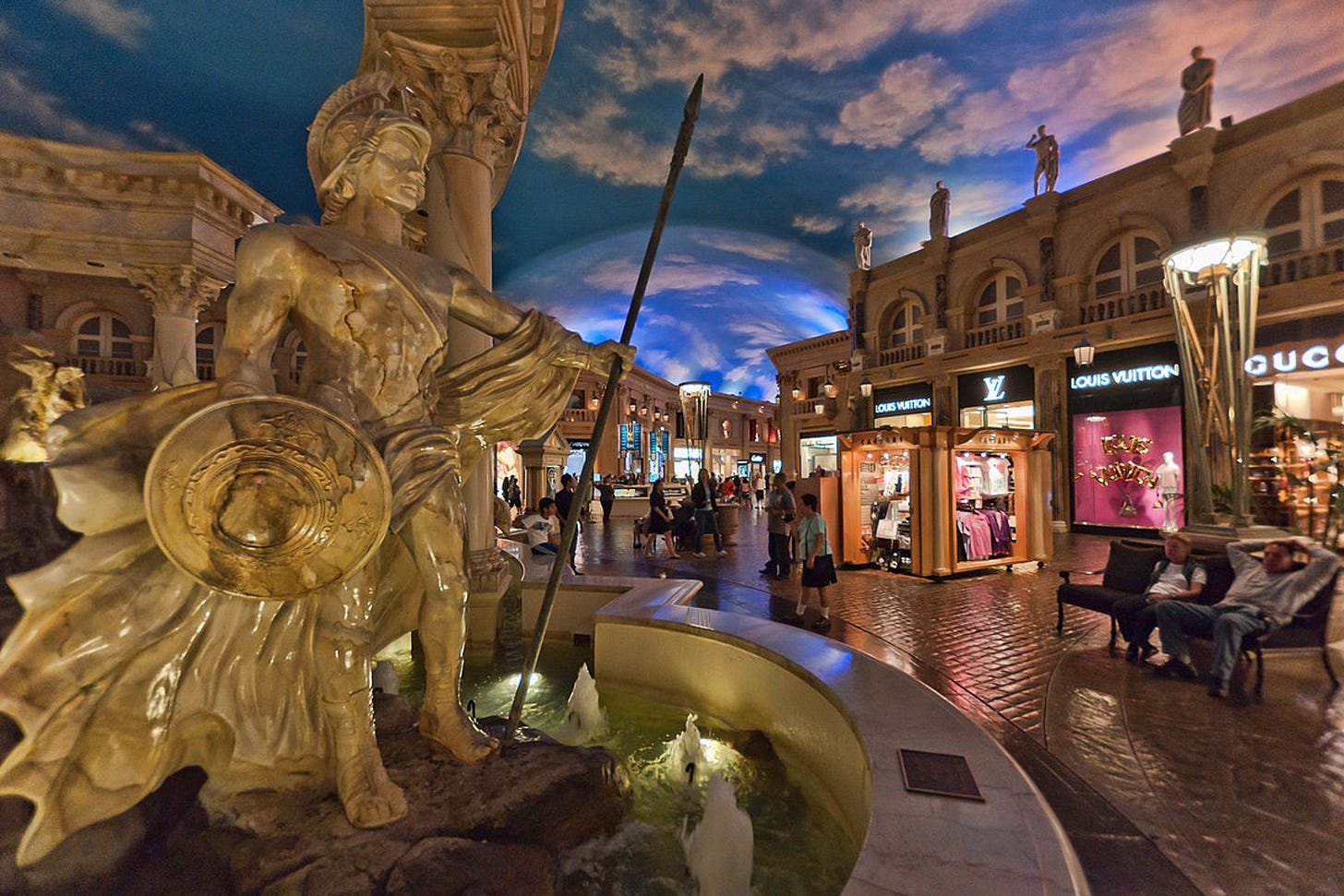Ed. note: The debut on this blog of friend and colleague !
Around nine months ago I set foot for the first time in Las Vegas. Since then, I haven’t been able to shake the memory of that bizarre place and the obscene logic that keeps it running. I started Natasha Dow Schüll’s Addiction by Design on the plane back home and binged it in 48 hours. This was an excellent starting point for my current obsession. But it was not quite enough. A wretched notion eventually wormed its way into my mind, one I am compelled to inflict on you: the Rosetta Stone of Las Vegas is none other than G.W.F. Hegel. We’ll get there in due time.
Schüll makes a brilliant study of the peculiar netting we find in Vegas and its effects on the people who get caught up in it. She consults with gambling addicts as intelligent, self-aware experts on what she calls the “zone” of gambling.1 A gambling session in Vegas is hard to walk away from, she finds, because of how it feels to the gambler. Everything in Vegas is designed to facilitate this particular feeling or quality of experience. As one player describes:
It starts while I’m on my way to the casino. I’m in the car driving, but in my mind I’m already inside, walking around to find my machine. In the parking lot, the feeling gets even stronger. By the time I get inside, I’m halfway into that zone. It has everything to do with the sounds, the lights, the atmosphere, walking through the aisles. Then when I’m finally sitting in front of the machine playing, it’s like I’m not even really there anymore—everything fades away.2

What exactly is the “zone”? Schüll draws a parallel to flow states—specifically to the “desubjectifying” effects of flow. “Much like mountain climbers who describe merging with the rocks they climb, or dancers who report feeling ‘danced’ by music,” she writes, gamblers feel “played by the machine.” Their sense of agency, along with their sense of their duties and ongoing life, are replaced with a sense of automaticity.3 Players discuss feeling “paralyzed” or “hypnotized,” to the point of not even being able to get up to go to the bathroom.4 As they play, the alterity of the machine dissolves, and they come to feel “connected to the machine […] as if physically you couldn’t separate [them] from the machine,”5 as if they “just zone into the screen and disappear.”6
The gambler transitions from feeling herself acting in response to the machine to feeling herself operating as a part of the machine and its processes. The point of her play is not to win or make money, but to maintain the sense of rhythm or “mechanically mediated tempo” that characterizes the “zone.”7 Her aim is just to keep her balance of credits in enough of an equilibrium for the gambling session to go on.8 Within the “zone,” she can only respond to the prompts and options that the machine provides—and this is precisely its draw. The routine player develops “a familiarity with the many different scenarios that play out” with a particular machine; the sequences of wins, losses, free plays, and bonus games become patterns that the player has seen “hundreds or even thousands of times before.”9 Whether she is winning or losing, the gambler in the “zone” feels safe. As one frequent player reflects:
Most people define gambling as pure chance, where you don’t know the outcome. But at the machines I do know: either I’m going to win, or I’m going to lose [...] the contract is that when I put a new coin in, get five new cards, and press those buttons, I am allowed to continue. So it isn’t really a gamble at all—in fact, it’s one of the few places I’m certain about anything. If I had ever believed that it was about chance, about variables that could make anything go in a given way at any time, then I would’ve been scared to death to gamble. If you can’t rely on the machine, you might as well be in the human world where you have no predictability either.10
Casinos make more of their profits off of these “escapist gamblers” than off the tourists who pass through Vegas and gamble for a thrill. Casinos are built to facilitate the “zone” for anyone drawn to it—and they’ve arrived at their design principles by collecting data on everyone who enters their doors. By tracking “foot traffic flow patterns” and “equipment occupancy rates,” casinos have found it most effective to break up floor layouts up with canopies, overhangs, and fake eaves, in order to give players “a sense of enclosure and ‘perceptual shelter.’ ”11 Upon finding that patrons “resist perpendicular turning,” they’ve curved the paths leading into gambling aisles and gotten the percentage of people who entered those areas to increase from one-third to nearly two-thirds.12 They’ve collected data on which sources of lighting, acoustics, and angles of screens patrons find least disturbing—all for the sake, as one supplier put it, of “stimulating their customers to respond to their environments.”13

It seems to me that, compared to the rest of contemporary human life, the phenomena of casinos and the “zone” are extraordinary only in degree, not in kind. Schüll herself suggests that the feeling of dissociation and automaticity she describes is one that “resonates […] with the everyday experience of many in contemporary capitalist societies.”14 I certainly found that her descriptions “resonated” with my experience of Vegas, despite never gambling at a slot machine and only playing a single hand of Blackjack (which I instantly lost). Having flown in to watch a multi-day sporting event, I killed time in the mornings wandering around casino malls and parking myself in hotel lobbies to write. But in Vegas, even these regular activities felt odd—almost dreamlike.
A mall in Vegas doesn’t feel like a mall in Boston. The most obvious differences are continuous with what Schüll describes. A fluorescent lighting system projects a cloudy, hypersaturated sky onto the domed ceilings, shifting between orangey dawn, daylight blue, and twilight violet. Inside Caesars Palace, there are replicas of Roman statues, stone-paved roads, and faux second stories above designer stores. No windows, no exit signs. I wandered into an antiques store selling china horses for triple the largest sum I’ve ever had in my bank account. The “streets” are garish yet somehow devoid of landmarks, and whenever I ambled around without an agenda, I always found myself back at an entry to the main casino floor.

At this point, some readers may have identified the “weirdness” I am harping on about with the sheer kitschiness of Vegas. Do not mistake me for some kind of kitsch virgin. I love kitsch. I am a friend of kitsch. Kitsch isn’t what makes Vegas weird. There are plenty of theme parks and tourist traps that make their daily bread from home-grown, honest kitsch. If you’ve ever been to Busch Gardens in Williamsburg, for instance, you may recall that it’s divided into ten “hamlets,” gaudy caricatures of European villages. Travel through the Swiss chalets of “Rhinefeld” and cross the “Oktoberfest bridge” to eat at Beste Brezeln und Bier; stop in at “Banbury Cross” to marvel at model replicas of the Globe Theatre, Big Ben, and even the classic British telephone booth (non-functional). Listen, I poke fun, but I love the silliness of these kinds of attractions. It’s like watching Bill Hader impersonate Al Pacino. It’s not a perfect replica, but it’s better that way—something in my mimetic monkey brain delights in seeing one or two recognizable features and feeling like I’m in on another guy’s corny joke.
I think this is how I’d like to sum up Vegas: it looks like a joke, but there’s no one trying to joke around with you. It looks like a marketplace, but there’s no one trying to make a deal with you. It looks like a monument to bad taste, but there’s no one trying to convince you that a replica of David’s marble cock is worth your time. Vegas exists as a feat of human engineering. It exists, as one designer puts it, “to influence movement and the circulation pattern and therefore direct people’s experience.”15 The particular way it influences and directs is by mimicking the genuinely social exchanges we have with each other. The results can be delightfully surreal while also strangely degrading.
What’s the problem with human engineering? Here is where we should bring Hegel into the conversation. Whether or not something is suitable for “engineering” depends on whether or not it is predictable, what kinds of limits there are to what it can do. Gravity, fluid dynamics, and other laws of physics fully determine which way water flows; therefore, we can build reservoirs and plumbing systems to move and hold water as we please. Animals are not inert the way water is, but their behavior, too, has certain limits to it. A beaver feels the threat of predators, thus the urge to make a dam. The beaver does not register a need for shelter, consider its options, and arrive at dam-making as a clever solution. The beaver’s nature fully determines how it will meet this need and others; as Hegel observes, “the urge is [...] immanent in the animal.”16
We do not need to assign any special metaphysical status to humans to say that humans differ from beavers in this respect. If I tell you “Juan is a human,” you do not have enough information to say how Juan meets his needs for food and shelter. He may take a rifle and bloodhound out into the Canadian marshlands; he may just as well entomb himself in a white button-down, mess around in an Excel sheet for 8 hours, and pick up Hot Pockets during his evening commute. We can argue about whether or not Juan’s lifestyle is caused or determined by something, but it is certainly not determined by the same thing, or in the same way, as a beaver’s building dams. We, along with Juan, have a kind of freedom that beavers do not.
To put the point another way (as Hegel does), we relate to our genus differently from animals. An individual animal does not really stand to make a difference to its genus. Any given beaver can be an adequate beaver or a deficient one. If this beaver is born with three legs, or taught through electric shocks not to build dams, or so on, its faring well or poorly will not make a difference to what beavers are, nor what they characteristically do. The individual animal is just part of the life cycle of its species; thus, “in this process of the genus, the merely natural being perishes.”17
An individual human being, on the other hand, plays a part in determining what humans characteristically do. And this is because what we are and what we do is thoroughly social (or, as Hegel would put it, spiritual). The various choices of lifestyle available to Juan are born out of our negotiations with each other. Working nine-to-five as an auditor is a viable way to make one’s daily bread just because of institutions we ourselves have established—taxation, payrolls, money itself, grocery stores, the Canadian government, and so on. What Juan needs to live his life as an auditor, or as a man in any other line of work, is different than what would satisfy his natural needs. He needs not just clothing, but a white button-down; not just shelter, but a one-bedroom apartment with a 30-minute commute by bike; in addition to these things, a B.A. degree, a cell phone, a five-blade electric razor. By participating in the public sphere, the world of markets and economies, our natural needs are transformed into spiritual needs. What we stand to gain by doing so is authorship of our own needs. We can renegotiate the norms of being an auditor, the institution of taxation, and so on. Maybe I didn’t come up with the idea of money, but somebody like me did, and I have a say (however miniscule) in what buying and selling will be like, going forward. As Hegel puts it, my needs are less alien or “external” to me than those of other animals; only by “eliminat[ing] natural simplicity [...] is spirit at home and with itself.”18
Even after entering this public sphere, however, it is still open to us to treat ourselves as natural beings, to explain our actions in terms of natural needs, urges, and environmental stimuli. These are precisely the terms in which projects of “human engineering” conceive of human beings.19 And these projects work. The casino designer conceives of people as e.g. having a natural need for shelter with a corresponding urge to occupy enclosed spaces, and canopies and fake eaves as capable of stimulating this urge. The result, by all appearances, actually does stimulate people to occupy slot machines in these spaces for hours on end.
Why does Vegas feel so weird? I opened with the claim that everything in Vegas is designed to facilitate “the zone.” I would like to reiterate that claim in a more troubling form: everything in Vegas treats me as a natural being—and this makes me so. When others take up projects that involve “stimulating [me] to respond to [my] environment” and “directing [my] experience,” they suppress the particular kind of freedom I describe above. And these projects really are everywhere. The salesman at the skincare shop doesn’t negotiate with me—he systematically determines which script to recite based on how many times I say “no.” The casino representative doesn’t offer me a meal voucher because she sees my stricken face and feels for me—she is dispatched by “an algorithm that calculates how much [I] can lose and still feel satisfied,” merely following the instructions of the casino’s “Pavlovian system of real-time relationship management.”20 If nature is the “sleep of spirit,”21 as Hegel puts it, then Vegas makes its money off of lullabies.22
As we have seen, it feels like something to have my freedom suppressed in this way. It is the feeling of paralysis, trance, disappearance, and desubjectification described by the gamblers above. Vegas is special, on the one hand, for letting us retrieve this kind of natural experience after we’ve developed our distinctive freedom. We submit ourselves to hypnotists and sensory deprivation chambers out of sheer curiosity—hooray for Sin City, the experimental sandbox of a lifetime. Vegas is threatening, on the other hand, for what it would have us discard to stay there. A life spent within “the zone”—a life “immersed in nature,” we might say23—is a life from which the subject is alienated. It is not hers to the same degree that my life is mine.
Vegas is far from the only entryway into “the zone.” Schüll leaves us with a far more global diagnosis: “contemporary capitalism is distinguished by strategic attempts to mobilize and derive value from consumers’ affective capacities.”24 Foucault, Marx, and Benjamin all draw a line from gambling to the mechanical factory, where “the workman’s gesture [...] is produced by the automatic operation.”25 And alongside the worker, the consumer, too, has his behavior stimulated, directed, produced. Everyone I know in higher education has been pulling their hair out over how disengaged and distracted their students are—whether they use carrots or sticks, students choose to keep scrolling through social media or online shopping. I worry that the dissociative zen of infinite scrolling isn’t best talked about in terms of “choice.” We are never given a discrete choice to be treated as a bundle of urges, and at the point where it begins to change us, the business of choosing may already be over. That is precisely what we stand to lose. It is possible to disrupt this process, I think, by persistently asking after each other’s plans and desires, arguing about them, and exchanging reasons for them. For if there is one natural law that touches the space of reasons, it must be: “use it or lose it.”
Natasha Dow Schüll, Addiction by Design: Machine Gambling in Las Vegas (Princeton: Princeton University Press, 2012), p. 24.
Ibid, p. 36.
Ibid, pp. 166-171.
Ibid, p. 103.
Ibid, p. 174.
Ibid, p. 189.
Ibid, p. 54; see also p. 177.
Ibid, p. 135.
Ibid, p. 133.
Ibid, p. 231.
Ibid, pp. 42-43.
Ibid, pp. 45-46.
Ibid, pp. 47-65.
Ibid, p. 24.
Ibid, p 37.
G.W.F. Hegel, Hegel’s Philosophy of Nature, translated by A.V. Miller, with introduction by J.N. Findlay (Oxford: Claredon Press, 2007), §361Z.
Hegel, Philosophy of Nature, §367 (see also Philosophy of Right, §190). This point was made much clearer to me through Sebastian Rödl’s November 2024 colloquium, “The Spiritual Life: Against Kant’s Formal Naturalism” (Boston: Harvard University).
[1] Hegel, Philosophy of Right, §187Z. This coheres with Hegel’s broader characterization of spirit as “the other to nature”; see further Angelica Nuzzo, "The Logic of Nature: Nature as the 'Idea in the Form of Otherness,'" in Hegel's Philosophy of Nature, edited by M. Bykova (Cambridge, Cambridge University Press, 2024), 97-118.
A related worry I have is whether the vast majority of sociological works are guilty of the same charge.
Schüll, Addiction by Design, p. 154.
Hegel, Philosophy of Nature, §389.
Hegel is generally open to the idea that we can regress into more natural states of mind, such as in cases of madness or hypnotic trance. See Hegel, Philosophy of Nature, §398.
Hegel, Philosophy of Nature, §194Z.
Schüll, Addiction by Design, p. 51.
Walter Benjamin, “The Work of Art in the Mechanical Age of Reproduction,” quoted in Schüll, Addiction by Design, p. 57.





